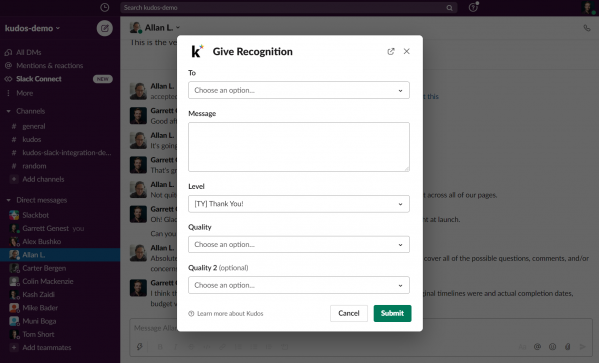Small businesses can drive innovation, build strong customer relationships, and ensure long-term success with a cohesive, well-structured team. But forming a team requires careful planning and the ability to align diverse personalities toward common goals.
This guide offers practical strategies for building a high-performing small business team. From defining core values to crafting an effective hiring process and fostering a positive company culture, we cover it all.
So, whether you’re starting fresh or refining an existing team, these insights will help you build a team that drives your business forward.
Defining your team's purpose and values
A strong team starts with a clear sense of purpose and a set of shared values that guide their actions. In a small business, where every team member plays a crucial role, aligning your team’s business objectives and marketing plans is essential for a cohesive, motivated workforce.
Importance of a clear company mission and vision
The foundation of a successful team lies in a well-defined company mission and vision. Your mission statement should articulate the core purpose of your business—why it exists and what it aims to achieve. It serves as a source of inspiration, motivating your team to work towards long-term goals.
When your team understands and embraces the mission and vision of the company, they are more likely to be engaged and committed to their work.

Aligning team goals with business objectives
Once your mission and vision are in place, the next step is to align your team’s goals with the broader business objectives. This involves setting clear, measurable goals for your team that directly contribute to the company’s strategic priorities. Whether it’s increasing sales, improving customer satisfaction, or launching a new product, each team member should understand how their role supports these objectives.
To achieve this alignment, it’s important to regularly communicate business goals to your team and involve them in the goal-setting process. This not only helps ensure that everyone is on the same page but also keeps everyone on the right track towards achieving the company’s strategic priorities.
Creating a strong company culture
Creating a strong company culture starts with identifying the core values that are most important to your business.
These values should reflect what you stand for as a company and how you want your team to operate. Once these values are established, it’s important to integrate them into every aspect of your business, from hiring and onboarding to performance reviews and daily operations.
By consistently reinforcing your company’s values, you can create a culture that supports your business goals and strengthens your team’s sense of identity and purpose.
Crafting an effective hiring process
A successful small business team begins with a solid hiring process that attracts candidates who fit your company culture and values, saving time and reducing turnover.
Defining roles and responsibilities
Clearly define roles and responsibilities for new hires to ensure they are integrated effectively into the team. Analyze your business needs, identify gaps, and create precise job descriptions that attract the right candidates and set clear expectations.

Attracting top talent
Showcase your company’s unique culture and values to attract top talent. Small business owners can leverage networking events to attract top talent by showcasing their unique company culture and values.
Also, use social media, employee referrals, and networking to reach candidates. Highlight growth opportunities and perks during the recruitment process.
Conducting effective interviews
Interviews should assess both skills and cultural fit. Use behavioral questions to understand candidates' past experiences. Involve multiple team members to gain diverse perspectives and ensure a well-rounded hiring decision.
Building a positive company culture
A strong company culture is key to a successful small business. It influences how your team interacts, works, and contributes to the business's success. Building this culture involves setting clear core values, fostering open communication, and recognizing contributions.
Defining and communicating core values
Core values guide your business’s operations and culture. Identify what’s most important to your business — like integrity, customer focus, or teamwork — and make these values a part of daily operations. Ensure everyone understands and embraces them through consistent communication in meetings, onboarding, and everyday practices.
Encouraging open communication
Open communication builds trust and collaboration. Create a space where team members feel comfortable sharing ideas and feedback. Regular check-ins, team meetings, and informal communication channels keep everyone connected and engaged.
Recognizing and rewarding team contributions
Recognition motivates and strengthens your culture. Implement both formal and informal recognition methods, like “Employee of the Month” awards or simple thank-yous, to show appreciation and keep morale high.

Developing your team
Building a strong small business team doesn’t stop at hiring the right people—it also involves nurturing their growth and development. Investing in your team’s ongoing development not only enhances their skills and knowledge but also boosts morale, job satisfaction and overall performance.
This section covers the importance of continuous training, setting clear performance expectations, and providing opportunities for growth and advancement.
Importance of ongoing training and development
Continuous learning is essential for keeping your team competitive and adaptable in a rapidly changing business environment. Regular training helps your team stay up-to-date with industry trends, new technologies and evolving customer needs. It also fosters a culture of continuous improvement, where employees are encouraged to develop their skills and contribute more effectively to the business.
Consider offering a mix of formal and informal learning opportunities. Formal training could include workshops, webinars or online courses that focus on specific skills relevant to your business. For example, if your business relies heavily on digital marketing, regular training on the latest marketing tools and strategies could be highly beneficial.
Additionally, leveraging professional support options, such as coaching services, can enhance team performance and address internal issues.
Informal learning, on the other hand, can happen through on-the-job training, mentoring and peer-to-peer learning. Encouraging team members to share their knowledge and expertise with each other can create a collaborative learning environment.
Setting clear performance expectations
For your team to perform at their best, it’s essential to set clear and achievable performance expectations. These expectations should align with your business goals and be communicated effectively to each team member. When employees understand what is expected of them, they can focus their efforts on achieving specific objectives, leading to better productivity and job satisfaction.
Start by setting SMART goals for each team member. These goals should be tailored to their role and responsibilities and should contribute to the broader business objectives.
Regularly review and adjust these goals as needed to reflect changes in the business or the market. Providing ongoing feedback is also critical. Regular performance reviews, whether formal or informal, allow you to discuss progress, address any challenges and offer support. Constructive feedback helps employees stay on track and identify areas where they can improve.
Providing opportunities for growth and advancement
As a small business owner, it’s important to create pathways for career progression within your organization.
Start by identifying potential career paths for each role within your company. Even in a small business, there are often opportunities for lateral moves, such as taking on new responsibilities or shifting to a different department, as well as upward mobility.
Communicate these opportunities to your team members and encourage them to pursue roles that align with their career goals.
In addition to promotions, consider offering professional development opportunities, such as leadership training or attending industry conferences. Participating in industry events is also crucial for professional development and networking opportunities. These experiences can help employees gain new skills and knowledge that prepare them for future roles within your company.
By investing in your team’s growth and development, you not only enhance their capabilities but also strengthen their loyalty to your business.
Everyday team management hacks
Keeping your team aligned and engaged doesn’t require hours of meetings – simple daily habits can make a huge impact. Here’s how to keep your team on track daily:
Morning: Set clear priorities
Start the day with a structured check-in to align everyone on key tasks. Whether your team is remote or in-office, a quick morning touchpoint helps eliminate confusion. You can do it by:
- Running a daily standup – A short 10-minute check-in where each team member shares what they’re working on, any blockers, and what support they need. This can be a quick call or a simple Slack update in a #dailystandup channel, which works especially well for remote teams across different time zones.
- Morning task updates – Instead of a meeting, send a short message outlining top tasks and deadlines so everyone starts on the same page.
- Priority board check-in – If your team uses a project management tool, encourage everyone to review and update their tasks first thing in the morning.
Midday: Streamline feedback
By midday, projects are moving, and small issues can snowball if left unchecked. Quick, real-time updates help keep everything on track without wasting hours in unnecessary meetings.
💡 Meetings cost more than you think: A one-hour meeting for 10 employees at an average hourly wage of $30.84 costs $308.40 – not including lost productivity or missed revenue opportunities. If each employee could generate $100 in that time, the opportunity cost jumps to $1,000.
That’s why it’s smarter to use a shared chat for instant updates or keep async check-ins short and structured. A simple format like 'What I’m working on – What I’m stuck on – What I need' helps everyone stay focused.
Afternoon: Encourage team recognition
As the day progresses, take a moment to acknowledge great work. Recognition doesn’t need to be formal – just consistent. Employees who feel appreciated are 69% more motivated to do their best work.
Make peer shoutouts a habit in a group chat or digital workspace. A simple #kudos tag can highlight efforts without disrupting workflow. You can quickly send recognition with the Kudos Slack integration, for example:

Celebrate small wins like closing a deal, tackling a tough task, or reaching a milestone. Don’t save it for the end of the day when people are winding down, and keep it meaningful – so it remains genuine and valued.
End of day: Wrap up with a recap
Before signing off, check in on progress. A quick update – whether in a chat or a brief team meeting – ensures everyone knows what got done and what still needs attention.
✅ Good recap: 'Today, we finalized the client proposal, resolved the issue with the payment system, and prepped for tomorrow’s demo. Let’s start with final checks on the presentation first thing in the morning.'
❌ Bad recap: 'We got some things done, some issues came up, and we’ll pick things up tomorrow.'
A clear recap helps avoid confusion and set a productive tone for the next day.
Overcoming common challenges
Running a small business team comes with its own set of hurdles, from resolving conflicts and managing remote workers to balancing workloads and avoiding burnout. Here’s how to tackle these challenges to keep your team strong and productive.
Addressing team conflicts
Conflicts are inevitable, but how you handle them matters. Encourage open communication and respect differences. Set up clear conflict resolution processes, and address issues quickly to prevent escalation. Properly managed conflicts can improve understanding and strengthen relationships.

Managing remote teams
Remote work offers flexibility but requires strong communication and clear expectations. Keep your team connected with regular check-ins and virtual meetings. Use project management tools to track productivity, and provide the necessary resources for remote success. Be mindful of different time zones and schedules.
Balancing workload and preventing burnout
Avoid burnout by regularly assessing workloads and ensuring tasks are evenly distributed. Encourage a healthy work-life balance and recognize signs of stress early. Support your team with resources for managing stress and maintaining well-being.
Building team resilience
Foster resilience by creating a supportive environment where challenges are seen as learning opportunities. Celebrate achievements, encourage growth, and provide tools for stress management to keep your team motivated and adaptable.
Making the best small business team with Capsule CRM
Building a strong small business team is not just about hiring the right people, it’s about creating an environment where your team can thrive, collaborate, and contribute to the long-term success of your business. From defining your team's purpose and aligning it with your business goals to creating a positive company culture and overcoming common challenges, every step you take in team building is an investment in your company’s future.
To further streamline your team management processes and enhance communication, consider integrating a CRM system like Capsule CRM into your business operations. Capsule CRM can help you manage customer relationships, track team activities, and ensure everyone is aligned with your business objectives. Sign up for a free trial of Capsule CRM today and discover how it can support your team’s success.
Frequently Asked Questions
Create an open environment where all ideas are valued and explored. Schedule regular brainstorming sessions and encourage cross-departmental collaboration to bring fresh perspectives. Allow time for experimentation and provide the necessary resources for creative projects. Recognize and reward innovative ideas, regardless of whether they are implemented, to reinforce a culture of creativity. Leadership should model innovative thinking and be open to calculated risks, fostering an atmosphere where creativity can thrive.
Establish clear individual goals while creating a team-oriented culture. Encourage healthy competition through transparent performance metrics and rewards, but also create team-based incentives where collective success benefits everyone. Promote knowledge sharing and regular team meetings to discuss strategies and successes. By balancing individual recognition with team rewards, you can maintain a competitive edge while ensuring collaboration and mutual support.



![Business statistics every business owner should know [2026]](https://cdn.sanity.io/images/poftgen7/production/5619faf6a65f53406d3e554c11c9e894402d4397-5760x3240.jpg?rect=5,0,5751,3240&w=300&h=169&q=75&fit=max&auto=format)
